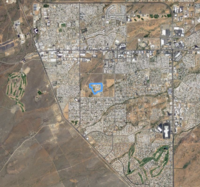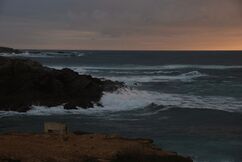Sun Republic
"Duskia" redirects here. For other uses of "Duskia", see Duskia (disambiguation).
The Sun Republic | |
|---|---|
| Motto: Wo ewige Berge knien Where the immortal mountains kneel | |
| Anthem: Sunset's Gate | |
 Location of the Sun Republic as depicted on a globe. | |
 The Sun Republic as depicted in Sierra Vista. | |
| Capital | Essen City Capital Region |
| Official languages | English, Duskiean |
| Religion | State-Sponsored Harmonism |
| Demonym(s) | Duskiean |
| Government | Federal Republic under a pro-socialist government |
• General Secretary | Leo Elliott |
• Deputy Secretary | Jacqueline Montanez |
• Officiator General | Adam Johnson |
• Lead Civil Representative | Kekoa Namuo |
| Legislature | People’s Representative House |
| The Supreme Senate | |
| The House of Representatives | |
| Establishment | 15 May 2017 Independence from Duskiean Empire 29 January 2019 Constitutional reform |
| Population | |
• 2019 census | 10 resigstered citizens |
| Currency | Duskiean KR. |
| Time zone | Mountain Standard Time |
| Date format | YYYY.MM.DD |
| Driving side | right |
| Internet TLD | .sun |
Website Government Website | |
The Sun Republic (S.R. or SR), colloquially referred to as The Sun Republic or Duskiea, constitutes a Micronation situated within North America, specifically within the Arizonan sector or the Kyberian Sector. Its territorial expanse encompasses three distinct autonomous states, a federal district, two cities, one major unincorporated territory, and several minor possessions. Essen City serves as the nation's capital, with the federal district bifurcated into Essen City (Major) and Essen City (Minor), the latter recognized as the technical governance territory of the nation.
Emerging as an independence movement in 2017 within the remnants of the former Duskian Empire, The Sun Republic was officially established subsequent to the dissolution of the Duskian Empire at midnight on May 15, 2017. This event marked the emergence of successor nations, namely The Sun Republic, The Southern Sun Empire, and The Empire of Buena. The aftermath witnessed the drafting of a constitution influenced by Western principles, advocating for a democratic system and transparency. This ultimately led to the organisation of The Sun Republic on September 27, 2017, later acknowledged as the national day.
Following the nations’ organisation, a new constitution was formulated: emphasizing personal freedoms and dismantling state control over individuality. The introduction of strongly federalized bureaucratic clauses faced opposition from the Socialist Party but were implemented given the stability concerns. Subsequently, a major constitutional reform in January 2019 addressed state power issues, notably in managing demonstrations, particularly those conducted online. This reform affirmed The Sun Republic's right to manage its information, leading to the reinstatement of the Duskian Public Broadcasting Corporation after a prolonged deactivation period. While promoting freedom of the press, speech, and religion, the Republic retains the authority to censor anti-state media in critical situations.
Etymology

The earliest known usage of the designation "Duskiea" can be traced back to circa late 2011, emerging within an email chain involving Carsten Huber and a select group of friends deliberating the conceptualization of a micronational entity within the Sierra Vista, Arizona region. Etymologically, the name is thought to have derived from the term "Dusk," connoting the darker phase of twilight, particularly during the nighttime hours.
The inaugural documentation referencing the phrase "Sun Republic" surfaces in a May 2017 record outlining the prospective establishment of a secessionist government amid the faltering Duskian Empire. This communication was addressed to Carsten Huber by the Duskian Senate. However, the final iteration of the document, known as the Treaty of Benson, did not explicitly incorporate the specific term "Sun Republic." Nevertheless, it laid the groundwork for a democratic presidency.
History
The foundational territory of the Sun Republic originated within the confines of another micronational entity, namely the Duskian Empire. Initiatives advocating for the transformation of the empire from a monarchy into a democratic republic began to gain traction. This grassroots faction faced suppression within the Duskiean Empire, as their appeals for legitimacy and reforms were disregarded by Carsten Huber, the monarch. This transformative movement spanned from late April to mid August 2017 until the Treaty of Benson: which marked a pivotal juncture signifying a negotiated resolution to the escalating tensions and signaling the shift towards a new era within the Duskian Empire.

Following the Treaty of Benson, The Sun Republic was formally established as the rightful successor to the dismantled monarchy. An immediate measure taken post-ratification was the systematic dismantling of all remnants of the Empire. Legislative certificates, commitments and related documents were annulled. The assets of the previous government underwent liquidation, and a substantial portion of the personnel were relieved of their duties. The nascent phase of the Sun Republic was characterized by a governance structure akin to a Military Junta, marked by direct executive control over individuals and the military. Widely criticized during this period, the Junta's direct governance style contributed significantly to the societal unrest and tensions during the establishment era. Following the initial governmental organisation of the Sun Republic, a swift withdrawal of Junta forces commenced, resulting in the relinquishment of control over the majority of the Empire's erstwhile territory. In a rapid sequence of events, the Sun Republic promptly renounced its claims to the established territories of its sister nations. This strategic maneuver underscored The Sun Republic's commitment to disengaging from territorial disputes and fostering amicable relations with its neighboring sister nations and the broader international community.

The inception of a new constitution heralded a distinctive governance structure within the Sun Republic, introducing a novel dual-presidency system wherein both presidents wielded equal and absolute authority, similar to the Roman Consuls. An element akin to hereditary right was instituted for incoming leaders, affording former leaders enduring influence to institute, amend, or revoke laws enacted by new presidents. The actions of the dual-presidency were subject to challenge solely once by an elected supreme council, yet both presidents retained veto powers over these challenges, fostering suspicions of a burgeoning "New Monarchy."
This unique model prevailed for over a year, The Sun Republic and bolstered the dominance of a powerful dual-presidency. The emergence of discontent and skepticism culminated in the War on Civics, fueled by the perceived concentration of power within the presidency. It wasn't until January of 2019 that significant reforms were enacted, transitioning the dual-presidency system towards total democracy and delineating a clear separation of powers within the government.
Democratic establishment
On January 29, 2019, a significant constitutional convention convened, aimed at scrutinizing the amendments made to The Sun Republic's constitution by the Sun Republic National Assembly. The primary revisions to the constitution centered on the establishment of a congress and the delineation of administrative powers between Essen City's major and minor districts. Notably, the previously entrenched "royal bloodline" feature, an artifact from the 2017 constitution, was discarded. Instead, the revised constitution heavily adopted language and power allocation principles akin to those employed by States.
The updated constitution provided additional vital information, elucidating the assembly's general structure, outlining specifics concerning general elections—inclusive of runoff elections—and addressing various smaller details that had been overlooked in the prior iteration of the constitution. This revised version of The Sun Republic's constitution remained effective until its eventual dissolution, undergoing minimal alterations primarily of a semantic nature.

Promotion of liberty
Within the Kyberian Sector, The Sun Republic has actively championed the establishment of micro-national republics while advocating for the overthrow of oppressive or authoritarian monarchies and governments resembling fascist regimes. The republic's methods in advancing this ideological stance have sparked intense debate, questioning the legitimacy and ethical grounds for intervening in the internal affairs of other micronations. Nevertheless, the nation continues to bolster its democratic ideals in the Kyberian Sector.
Government

The governance structure of The Sun Republic comprises three primary branches—judicial, executive, and legislative—each vested with distinct powers delineated by the 2019 constitutional revision, solidifying the assurance of a separation of powers. Subsequent to this revision, additional branches were established to further reinforce this division.
The government's overarching objective centers on safeguarding, implementing, and amending the constitution in the interests of its citizens. Each branch houses elected officials—congressmen, representatives, and judges—selected via a general election process and admission ratified by the Supreme Council.
The Executive branch shoulders the responsibilities of the dual Presidents, tasked with upholding the constitution, enforcing laws, and safeguarding the nation from both internal and external threats. Operating within a strongly federalized bureaucratic system, The Sun Republic's government assumes the authority to legislate, adjudicate punishments, effect revisions, expansions, and issue decrees outlined within the constitutional framework.
The Judicial branch, regarded as the foremost branch of government within The Sun Republic, parallels the role of the judicial branch in the United States, primarily tasked with adjudicating the constitutionality of enacted laws. Judges within this branch hold their positions for life or until circumstances such as impeachment, voluntary resignation, or incapacitation.
The Legislative branch is considered the second major branch of government, and is by far the largest. The legislative branch consists of a House of Congress, a House of Representatives, and a Supreme Council.
Military
Drawing substantial inspiration from the French military, The Sun Republic's armed forces operate within a highly regimented and somewhat inflexible framework. The system is characterized by steadfast adherence to established rules and regulations, with any alterations regarded as significant events within the Republic. The military's duties are notably specialized, with a primary focus on ceremonial activities and musical performances during events. A majority of active military personnel serve as band members, necessitating a mandatory two-year service commitment within the military ensemble. The routine tasks of the military involve regular marches throughout the Essen City Capital Region, allowing for practice and refinement of marching routines. This disciplined practice is integral to their training and proficiency.
Culture
The ethos of The Sun Republic is deeply rooted in Western culture, celebrated through an ardent appreciation for the sun-kissed outdoors—a sentiment inherently shaped by its geographical placement in the southwestern expanse of North America. The nation boasts a multitude of areas replete with fans and shaded alcoves, providing ample space for individuals to unwind and relish outdoor leisure.
Notably, the Duskian Army partakes in what are colloquially termed "vacations," journeying into the neighboring mountains—an activity serving as a form of respite and exploration for military personnel.
Life within The Sun Republic currently thrives, with the government keenly attuned to showcasing its best facets and earnestly engaging with the populace to discern their aspirations and needs. The Republic features an educational domain offering a diverse array of subjects, encompassing mathematics to the artistry of poetry, fostering a comprehensive learning environment accessible to all.
Traditionally inclined toward an offline orientation, The Sun Republic has historically prioritized fulfilling its duties away from the digital sphere. However, recent developments such as the establishment of the International Data Committee and the inception of a Cyber branch within the military signal an evolving stance. These initiatives underscore a deliberate effort to transition towards a more open and interconnected stance on the global stage.


